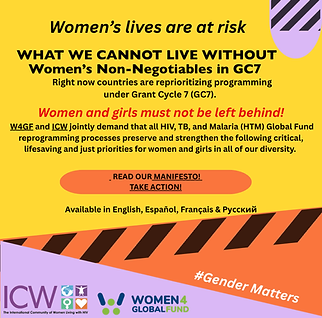
ICW seeks to expand our work to address persistent gender inequity in Global Fund National Planning as well as in Global Fund processes.
Promoting and protecting human rights and gender equality an objective of the Global Fund Strategy 2017 – 2022 and should provide robust opportunities for community advocates addressing gender inequality in HIV, TB and malaria to participate and access resources. However, a recent report commissioned by UNAIDS on the Prioritization in Global Fund Grants: revealed that out of 46 funding requests submitted in the 2020-2022 allocation cycle indicated that only 1 had utilized a gender assessment in its funding prioritization process.
A lack of influence or accountability in the prioritization processes have led to women’s programs and projects being underfunded, or deprioritized once the hurdles for proposals are met which results in minimal funding to women’s networks and the relegation of funding available only to prevention of vertical transmission services. To remedy this ICW proposes to strengthen the engagement of women living with HIV utilizing evidence -based advocacy from networks of women living with HIV to ensure that Global Fund processes including the development of country proposals and funding prioritization as well as Global Fund Adjacent processes such national AIDS planning processes actually achieve adequate resource allocation towards interventions that address gender inequality, promote equality and protect women and girls, including women from key populations.
Help us with this survey to strengthen women's engagement in the Global Fund processes.
ICW is collaborating with W4GF to map the needs of women's networks to be meaningfully involved in Global Fund processes. We have developed a survey to gather experience and evidence on what is needed to increase our participation means to have evidence-informed planning and budgeting for gender-transformative HIV responses.
What Women Cannot Live Without in GC7 re-prioritization!

Check out ICW and Women 4 Global Fund's manifesto of non-negotiables for women living with HIV for HIV, TB and malaria in the Global Fund GC7 reprioritization process.
We conducted a rapid assessment through ICW networks and with partners YOUNITE TB, TB Women & CS4ME to develop this core list of non-negotiables! We know from experience that too often, gendered priorities—especially those of women, girls, and key populations—have been sidelined and deprioritized. In this moment of crisis, it is vital that women’s and girls' priorities are fully recognized and included in decisions about lifesaving care!
Watch the Webinar! This webinar, co-hosted by ICW Global and Women4GlobalFund (W4GF) highlighted women’s non-negotiables and advocacy strategies to ensure feminist priorities are fully reflected in Global Fund processes.
Speakers:
• Immaculate Bazare Owomugisha, Board Member ICW
• Ángela León Cáceres, Global Coordinator, W4GF
• Medea Khmelidze, Executive Director, Eurasian Women's Network on AIDS
• Alia Amimi, Global Advocacy Lead, W4GF
Read Our Manifesto ! Click your preferred language below
#GenderMatters

Strengthening the Engagement Of Women Living with HIV-led Networks Foundations Webinar Series
ICW and W4GF, in collaboration with LAC Plataform/VIA LIBRE, hosted the webinar “Global Fund 101" for Women living with HIV and KP women to be meaningful involvement in the GC7 funding request process and increase gender equity in prioritization.

